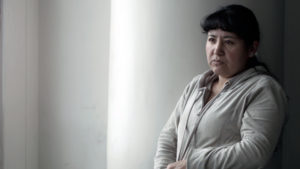
The ten rules of doctors’ engagement
Review of Patient, Colombia, 2015, directed by Jorge Caballero
Screening at the London Film Festival, 15 and 16th October 2016
https://whatson.bfi.org.uk/lff/Online/seatSelect.asp
https://whatson.bfi.org.uk/lff/Online/mapSelect.asp
Reviewed by Dr Khalid Ali, Screening Room Editor
The Oxford Dictionary defines the word ‘patient’ as ‘a person receiving or registered to receive medical treatment’. Jorge Caballero uses ‘patient’ as the title for his documentary film, but we never get the see the patient, Leidy, a 23-year old girl who is bed-bound with an aggressive form of neuro-ectodermal tumour. The focus of the narrative is Nubia, Leidy’s long-suffering and ‘patient’ mother. Nubia is constantly with her daughter, pushing her hospital bed around to chemotherapy sessions, and for never-ending x-rays. When the doctors declare that the cancer is in its most-aggressive and terminal stage, Nubia decides to take her daughter home. However, first she needs an adequate supply of pain-relief medication. Securing these crucial medicines for Leidy’s comfort and dignity is a never ending quest between several hospital departments for official approval. Finding an ambulance to take them home is another harrowing exercise in endless bureaucracy. Nubia’s exhausting daily routine is only interrupted by brief moments of following ‘Colombia’s top model’ contest on TV.
Watching Patient reminded me of this statement from the Hippocrates oath: ‘I will remember that there is art to medicine as well as science, and that warmth, sympathy, and understanding may outweigh the surgeon’s knife or the chemist’s drug’.
Here are the ten lessons that doctors can learn from ‘Patient’:
*Don’t be afraid to say ‘I don’t know’, if you don’t know, don’t waffle: In one scene a junior doctor tries to comfort Nubia by asking her to keep ‘calm, be positive and tranquil’ when she was actually asking for an honest opinion of her daughter’s prognosis.
*Avoid jargon: in another scene, doctors explaining a possible tracheostomy tube for Leidy is a master-class in communicating the need for a complicated procedure with its associated risks and benefits- sensitively handled, ensuring understanding and offering the chance for questions and comments.
*Show empathy towards patients and their families: in several exchanges between Nubia and doctors caring for her daughter, it was clearly obvious that she was desperately seeking a professional to hold her hand in empathy.
*Reassure patients and families when dealing with intractable pain, and encourage them to ask if pain is not controlled: Nubia was constantly blaming herself for not getting the dose of pain relief right. She never questioned the hospital doctors’ prescribing competency.
*Plan ahead and get medications ready for a timely discharge: Booking an ambulance, getting the insurance paper work ready, and collecting her daughter’s medicines on the discharge day was a ‘mission impossible’ for Nubia.
*Respect patients’ confidentiality: In a sensitive approach to Leidy’s agony as a young girl at the end of her life, the film director never shows her face in a powerful statement of maintaining her dignity, and upholding her capacity in choosing not to be filmed.
*Care for the carer: after grilling journeys between various hospital departments, and home trips to get Leidy what she needs, it was apparent that Nubia wanted someone to ask her how she felt, and perhaps suggest some respite.
*Offer spiritual support: no mention was made of Nubia’s spiritual beliefs or if she practised any religion in the film. It might have been something that she was afraid to ask for! So as a doctor, do not forget to ask.
*Encourage patients and their families to share their hospital experience with each other: in a brief encounter with a fellow mother of another girl in hospital, Nubia gets to exchange a few tips on how to handle their ill daughters ‘crises’. Through this ‘solidarity and companionship’ both ‘patient mothers’ experienced a transient sense of support.
*Life can be short, so value every moment.
Address for correspondence
Dr Khalid Ali: Khalid.ali@bsuh.nhs.uk